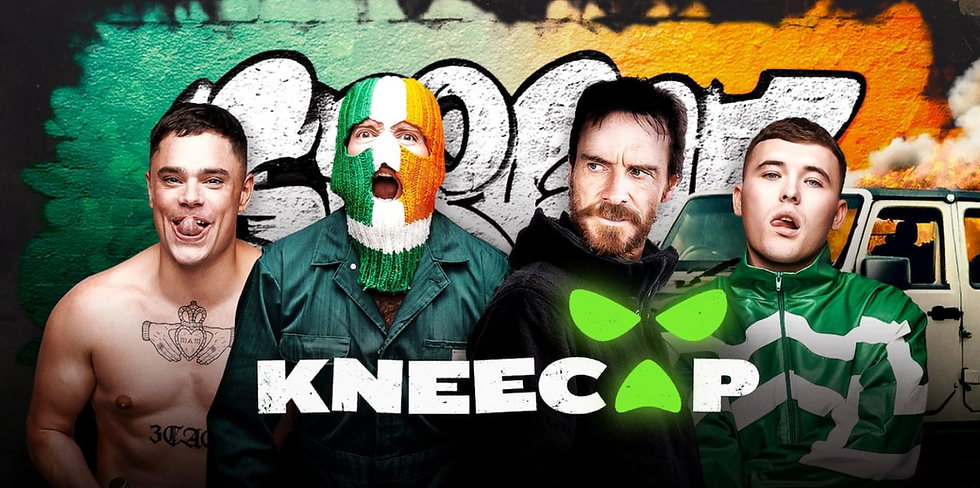Dr. A-L Tells: What to Read & Watch- Kneecap
- Aug 10, 2025
- 3 min read
Welcome to my blog series Dr. A-L Tells: What to Read & Watch, where I get to share with you some of my favourite finds from books, films, & other gems that resonated with me so deeply I just had to write about them! In each post, I’ll keep it short & sweet with a 500-word-ish review of something I’ve recently read or watched, often centring Black people, identity, & diverse experiences around the globe.
This series mixes my personal reflections, feelings, & academic insights to offer a fresh take on stories that capture the richness & complexity of Black voices worldwide. I’m here to explore the layers of culture, history, & identity while unpacking how these narratives hit home for me on both intellectual & emotional levels. So, whether you’re in the mood for a thoughtful analysis or just a solid recommendation, I hope each post brings a quick but meaningful spark to your day! ✨
In this post, I dive into the film Kneecap (2024).
I have long been intrigued by the Irish struggle. Drawn to its layered pain & poetry, I have asked Irish friends for film recommendations, searching for context. On a visit to Dublin, the sanitised, tourist-friendly gloss left me unsatisfied. I wanted the grit, the story beneath the souvenir shops. Then came Kneecap, a six-time BAFTA-nominated comedic drama that showed up on Amazon Prime, offering a raw, raucous, & revelatory take on language as resistance. Prayers, answered.

Kneecap is based on the real-life Belfast hip hop trio of the same name. Rapping in Irish, with a sharp tongue & sharper politics, the group makes art not just for entertainment, but for survival. The film blends Irish & English, subtitles, animated flourishes & lyrics that are lyrical grenades. It opens not in a concert hall or club, but deep in the woods. A Catholic baptism, conducted illegally under police surveillance. Helicopters whirl above, echoing the long, bruising history of criminalising Irish identity.
This is not just a film. It is an assertion. A shout. A prayer. & a lesson.
We are introduced to a teacher, his wife, & two fiery young men from different backgrounds. All are united by one thing: a deep love for the Irish language & the future it deserves. Their methods differ, but the foundation is firm. Their bond is stitched with pride & the pain of knowing how close erasure always looms.
Graffiti tags the city walls, alongside Palestinian flags & portraits of African American civil rights leaders. It is a Belfast that speaks in many tongues, all echoing the same cry for dignity. Language is not decorative here. It is the terrain of battle. Arlo, father of protagonist Naoise, tells him:
“Every word of Irish spoken is a bullet fired for Irish freedom… you’re that bullet, son.”
& the stakes are real. Only 80,000 people speak Irish fluently. Just 6,000 live in the North of Ireland. Across the globe, 40 Indigenous languages vanish each day. From Jamaican patois to Akan & Zulu, from Scots Gaelic to Welsh, the mother tongues are slipping through our fingers.
Kneecap refuses to let go.
I was struck, too, by the soundtrack. A wild techno-hip hop hybrid. There is an honest appreciation of hip hop’s Black roots, & not in a superficial, borrowed sense. It is acknowledged, honoured, & then reworked into something uniquely Irish. The result? A sound that is ancestral & futuristic all at once.
The film also does not shy away from the uncomfortable truths. British colonial violence echoes across Ireland, Scotland & Wales. But there is also a reminder that those who have been oppressed can sometimes become oppressors. Anti-immigration sentiment & racism in modern Northern Ireland mirror patterns we have seen elsewhere. It is sobering, & important.
This film showed me the power of learning about other struggles. There is healing in the parallels, & power in the differences. As one character reminds us:
“Stories are built from language. Nations are built from stories. This is our story.”
& what a story it is. It ends with a hauntingly beautiful Irish folk song, sung by the protagonist’s mother, flashing between memories of rebellion & rebirth. I sat there, quiet, tears slowly gathering.
Kneecap spoke, & I listened.
Watch Kneecap here now & please share your thoughts!



Comments